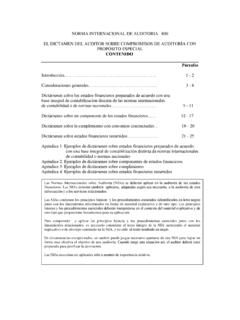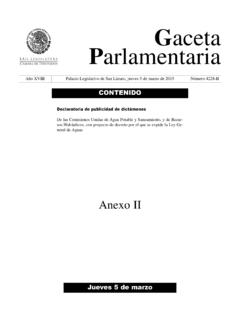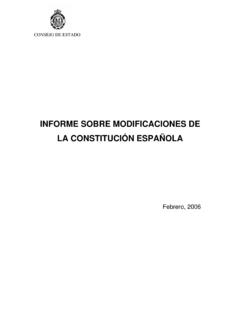Transcription of United Nations S Security Council - arso.org
1 United Nations S/2002/161. Security Council Distr.: General 12 February 2002. Original: English Letter dated 29 January 2002 from the Under-Secretary-General for Legal Affairs, the Legal Counsel, addressed to the President of the Security Council 1. In a letter addressed to me on 13 November 2001, the President of the Security Council requested, on behalf of the members of the Council , my opinion on the legality in the context of international law, including relevant resolutions of the Security Council and the General Assembly of the United Nations , and agreements concerning Western Sahara of actions allegedly taken by the Moroccan authorities consisting in the offering and signing of contracts with foreign companies for the exploration of mineral resources in Western Sahara . 2. At my request, the Government of Morocco provided information with respect to two contracts, concluded in October 2001, for oil-reconnaissance and evaluation activities in areas offshore Western Sahara, one between the Moroccan Office National de Recherches et d'Exploitations Petroli res (ONAREP) and the United States oil company Kerr McGee du Maroc Ltd.
2 , and the other between ONAREP. and the French oil company TotalFinaElf E&P Maroc. Concluded for an initial period of 12 months, both contracts contain standard options for the relinquishment of the rights under the contract or its continuation, including an option for future oil contracts in the respective areas or parts thereof. 3. The question of the legality of the contracts concluded by Morocco offshore Western Sahara requires an analysis of the status of the Territory of Western Sahara, and the status of Morocco in relation to the Territory. As will be seen, it also requires an analysis of the principles of international law governing mineral resource activities in Non-Self-Governing Territories. 4. The law applicable to the determination of these questions is contained in the Charter of the United Nations , in General Assembly resolutions pertaining to decolonization, in general, and economic activities in Non-Self-Governing Territories, in particular, and in agreements concerning the status of Western Sahara.
3 The analysis of the applicable law must also reflect the changes and developments which have occurred as international law has been progressively codified and developed, as well as the jurisprudence of the International Court of Justice and the practice of States in matters of natural resource activities in Non-Self-Governing Territories. 02-24987 (E) 120202. *0224987*. S/2002/161. A. The status of Western Sahara under Moroccan administration 5. A Spanish protectorate since 1884, Spanish Sahara was included in 1963 in the list of Non-Self-Governing Territories under Chapter XI of the Charter (A/5514, annex III). Beginning in 1962, Spain as administering Power transmitted technical and statistical information on the Territory under Article 73 e of the Charter of the United Nations . This information was examined by the Special Committee on the Situation with regard to the Implementation of the Declaration on the Granting of Independence to Colonial Countries and Peoples ( the Special Committee ).
4 In a series of General Assembly resolutions on the question of Spanish/Western Sahara, the applicability to the Territory of the Declaration on the Granting of Independence to Colonial Countries and Peoples (General Assembly resolution 1514 (XV)) was reaffirmed. 6. On 14 November 1975, a Declaration of Principles on Western Sahara was concluded in Madrid between Spain, Morocco and Mauritania ( the Madrid Agreement ), whereby the powers and responsibilities of Spain, as the administering Power of the Territory, were transferred to a temporary tripartite administration. The Madrid Agreement did not transfer sovereignty over the Territory, nor did it confer upon any of the signatories the status of an administering Power, a status which Spain alone could not have unilaterally transferred. The transfer of administrative authority over the Territory to Morocco and Mauritania in 1975 did not affect the international status of Western Sahara as a Non-Self-Governing Territory.
5 7. On 26 February 1976, Spain informed the Secretary-General that as of that date it had terminated its presence in Western Sahara and relinquished its responsibilities over the Territory, thus leaving it in fact under the administration of both Morocco and Mauritania in their respective controlled areas. Following the withdrawal of Mauritania from the Territory in 1979, upon the conclusion of the Mauritano-Sahraoui agreement of 19 August 1979 (S/13503, annex I), Morocco has administered the Territory of Western Sahara alone. Morocco, however, is not listed as the administering Power of the Territory in the United Nations list of Non-Self- Governing Territories, and has, therefore, not transmitted information on the Territory in accordance with Article 73 e of the Charter of the United Nations . 8. Notwithstanding the foregoing, and given the status of Western Sahara as a Non-Self-Governing Territory, it would be appropriate for the purposes of the present analysis to have regard to the principles applicable to the powers and responsibilities of an administering Power in matters of mineral resource activities in such a Territory.
6 B. The law applicable to mineral resource activities in Non-Self- Governing Territories 9. Article 73 of the Charter of the United Nations lays down the fundamental principles applicable to Non-Self-Governing Territories. Members of the United Nations who assumed responsibilities for the administration of these Territories have thereby recognized the principle that the interests of the inhabitants of these Territories are paramount, and have accepted as a sacred trust the obligation to promote to the utmost the well-being of the inhabitants of these Territories. Under Article 73 e of the Charter, they are required to transmit regularly to the Secretary- 2. S/2002/161. General for information purposes statistical and other information of a technical nature relating to economic, social, and educational conditions in the Territories under their administration. 10. The legal regime applicable to Non-Self-Governing Territories was further developed in the practice of the United Nations and, more specifically, in the Special Committee and the General Assembly.
7 Resolutions of the General Assembly adopted under the agenda item entitled Implementation of the Declaration on the Granting of Independence to Colonial Countries and Peoples called upon the administering Powers to ensure that all economic activities in the Non-Self- Governing Territories under their administration did not adversely affect the interests of the peoples of such Territories, but were instead directed towards assisting them in the exercise of their right to self-determination. The Assembly also consistently urged the administering Powers to safeguard and guarantee the inalienable rights of the peoples of those Territories to their natural resources, and to establish and maintain control over the future development of those resources (resolutions 35/118 of 11 December 1980, 52/78 of 10 December 1997, 54/91 of 6 December 1999, 55/147 of 8 December 2000 and 56/74 of 10 December 2001).
8 11. In the resolutions adopted under the agenda item entitled Activities of foreign economic and other interests which impede the implementation of the Declaration on the Granting of Independence to Colonial Countries and Peoples in Territories under colonial domination , the General Assembly reiterated that the exploitation and plundering of the marine and other natural resources of colonial and Non-Self- Governing Territories by foreign economic interests, in violation of the relevant resolutions of the United Nations , is a threat to the integrity and prosperity of those Territories , and that any administering Power that deprives the colonial peoples of Non-Self-Governing Territories of the exercise of their legitimate rights over their natural resources .. violates the solemn obligations it has assumed under the Charter of the United Nations (resolutions 48/46 of 10 December 1992 and 49/40 of 9.)
9 December 1994). 12. In an important evolution of this doctrine, the General Assembly, in its resolution 50/33 of 6 December 1995, drew a distinction between economic activities that are detrimental to the peoples of these Territories and those directed to benefit them. In paragraph 2 of that resolution, the General Assembly affirmed the value of foreign economic investment undertaken in collaboration with the peoples of the Non-Self-Governing Territories and in accordance with their wishes in order to make a valid contribution to the socio-economic development of the Territories . This position has been affirmed by the General Assembly in later resolutions (resolutions 52/72 of 10 December 1997, 53/61 of 3 December 1998, 54/84 of 6. December 1999, 55/138 of 8 December 2000 and 56/66 of 10 December 2001). 13. The question of Western Sahara has been dealt with both by the General Assembly, as a question of decolonization, and by the Security Council , as a question of peace and Security .
10 The Council was first seized of the matter in 1975, and in its resolutions 377 (1975) of 22 October 1975 and 379 (1975) of 2 November 1975 it requested the Secretary-General to enter into consultations with the parties. Since 1988, in particular, when Morocco and the Frente Popular para la Liberac on de Saguia el-Hamra y del R o de Oro (Frente POLISARIO) agreed, in principle, to the settlement proposals of the Secretary-General and the Chairman of the Organization of African Unity, the political process aiming at a peaceful settlement 3. S/2002/161. of the question of Western Sahara has been under the purview of the Council . For the purposes of the present analysis, however, the body of Security Council resolutions pertaining to the political process is not relevant to the legal regime applicable to mineral resource activities in Non-Self-Governing Territories and for this reason is not dealt with in detail in the present letter.



